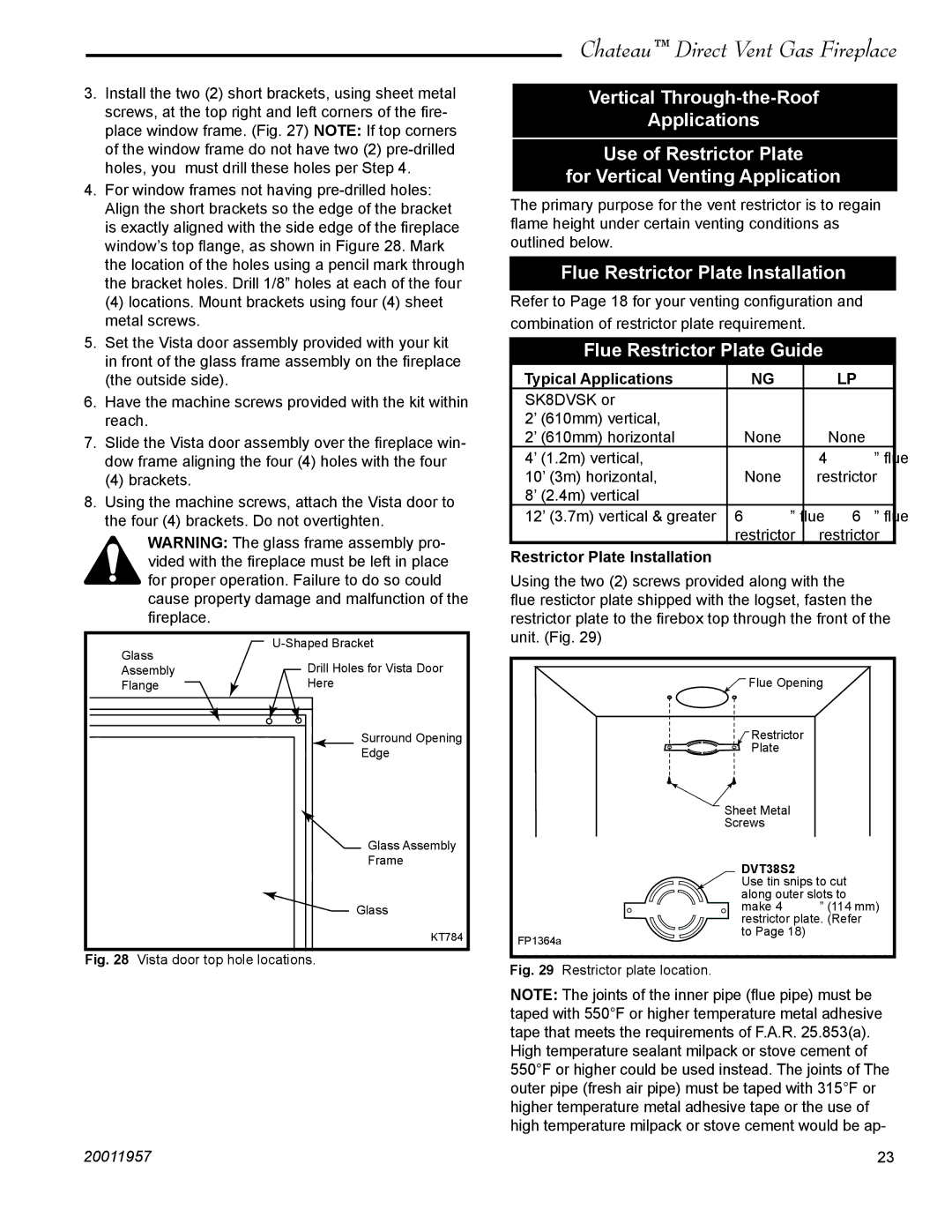
3.Install the two (2) short brackets, using sheet metal screws, at the top right and left corners of the fire- place window frame. (Fig. 27) NOTE: If top corners of the window frame do not have two (2)
4.For window frames not having
(4)locations. Mount brackets using four (4) sheet metal screws.
5.Set the Vista door assembly provided with your kit in front of the glass frame assembly on the fireplace (the outside side).
6.Have the machine screws provided with the kit within reach.
7.Slide the Vista door assembly over the fireplace win- dow frame aligning the four (4) holes with the four
(4)brackets.
8.Using the machine screws, attach the Vista door to the four (4) brackets. Do not overtighten.
WARNING: The glass frame assembly pro- vided with the fireplace must be left in place for proper operation. Failure to do so could cause property damage and malfunction of the fireplace.
Glass | ||
Drill Holes for Vista Door | ||
Assembly | ||
Flange | Here | |
| Surround Opening | |
| Edge | |
| Glass Assembly | |
| Frame |
Chateau™ Direct Vent Gas Fireplace
Vertical
Applications
Use of Restrictor Plate
for Vertical Venting Application
The primary purpose for the vent restrictor is to regain flame height under certain venting conditions as outlined below.
Flue Restrictor Plate Installation
Refer to Page 18 for your venting configuration and combination of restrictor plate requirement.
Flue Restrictor Plate Guide
Typical Applications | NG | LP |
SK8DVSK or |
|
|
2’ (610mm) vertical, |
|
|
2’ (610mm) horizontal | None | None |
4’ (1.2m) vertical, |
| 4¹⁄₂” flue |
10’ (3m) horizontal, | None | restrictor |
8’ (2.4m) vertical |
|
|
12’ (3.7m) vertical & greater | 6³⁄₄” flue | 6³⁄₄” flue |
| restrictor | restrictor |
Restrictor Plate Installation |
|
|
Using the two (2) screws provided along with the flue restictor plate shipped with the logset, fasten the restrictor plate to the firebox top through the front of the unit. (Fig. 29)
![]() Flue Opening
Flue Opening
Restrictor
Plate
Sheet Metal
Screws
Glass |
KT784 |
FP1364a
DVT38S2
Use tin snips to cut along outer slots to make 4¹⁄₂” (114 mm) restrictor plate. (Refer to Page 18)
Fig. 28 Vista door top hole locations.
Fig. 29 Restrictor plate location.
NOTE: The joints of the inner pipe (flue pipe) must be taped with 550°F or higher temperature metal adhesive tape that meets the requirements of F.A.R. 25.853(a). High temperature sealant milpack or stove cement of 550°F or higher could be used instead. The joints of The outer pipe (fresh air pipe) must be taped with 315°F or higher temperature metal adhesive tape or the use of high temperature milpack or stove cement would be ap-
20011957 | 23 |
